SBM3204 - Sustainability and Ethics: Individual Reflection Report
VerifiedAdded on 2022/11/15
|10
|2245
|275
Report
AI Summary
This report is a student's self-reflection on their learning in a Sustainability and Ethics course (SBM3204). The report explores the understanding of regulations, laws, and business ethics within organizations. It delves into organizational values that support ethical decision-making, evaluates the implications of social and public pressure on ethical behavior, identifies and responds to ethical dilemmas, and promotes corporate responsibility. The student connects their learning to specific aspects of the course, providing evidence and examples to support their statements. The report covers topics such as the significance of business ethics and laws, organizational values, social pressure, ethical dilemmas, and corporate social responsibility. The student provides insights into ethical decision making, the role of ethics in business operations, and the impact of external factors on organizational behavior.
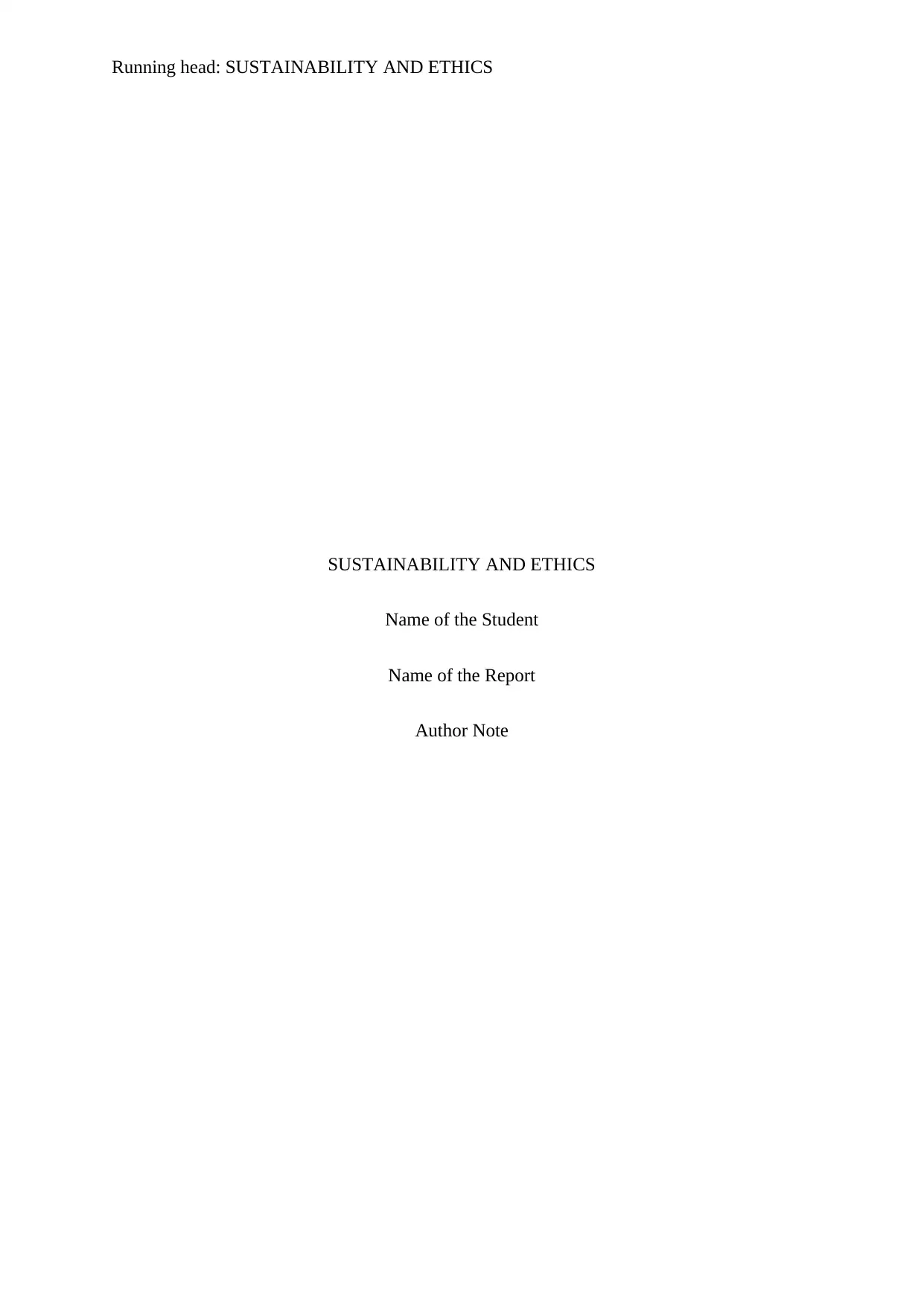
Running head: SUSTAINABILITY AND ETHICS
SUSTAINABILITY AND ETHICS
Name of the Student
Name of the Report
Author Note
SUSTAINABILITY AND ETHICS
Name of the Student
Name of the Report
Author Note
Paraphrase This Document
Need a fresh take? Get an instant paraphrase of this document with our AI Paraphraser
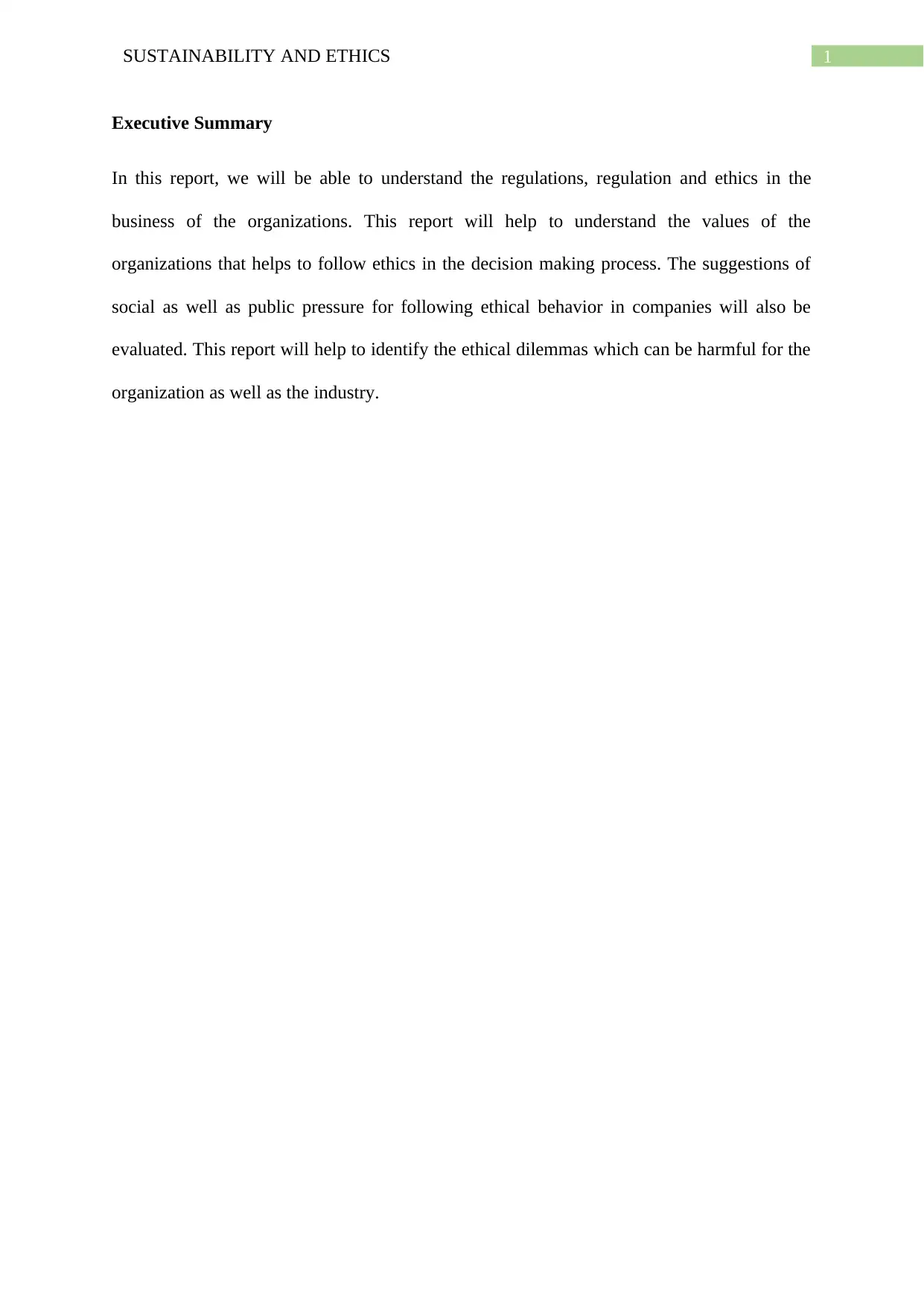
1SUSTAINABILITY AND ETHICS
Executive Summary
In this report, we will be able to understand the regulations, regulation and ethics in the
business of the organizations. This report will help to understand the values of the
organizations that helps to follow ethics in the decision making process. The suggestions of
social as well as public pressure for following ethical behavior in companies will also be
evaluated. This report will help to identify the ethical dilemmas which can be harmful for the
organization as well as the industry.
Executive Summary
In this report, we will be able to understand the regulations, regulation and ethics in the
business of the organizations. This report will help to understand the values of the
organizations that helps to follow ethics in the decision making process. The suggestions of
social as well as public pressure for following ethical behavior in companies will also be
evaluated. This report will help to identify the ethical dilemmas which can be harmful for the
organization as well as the industry.
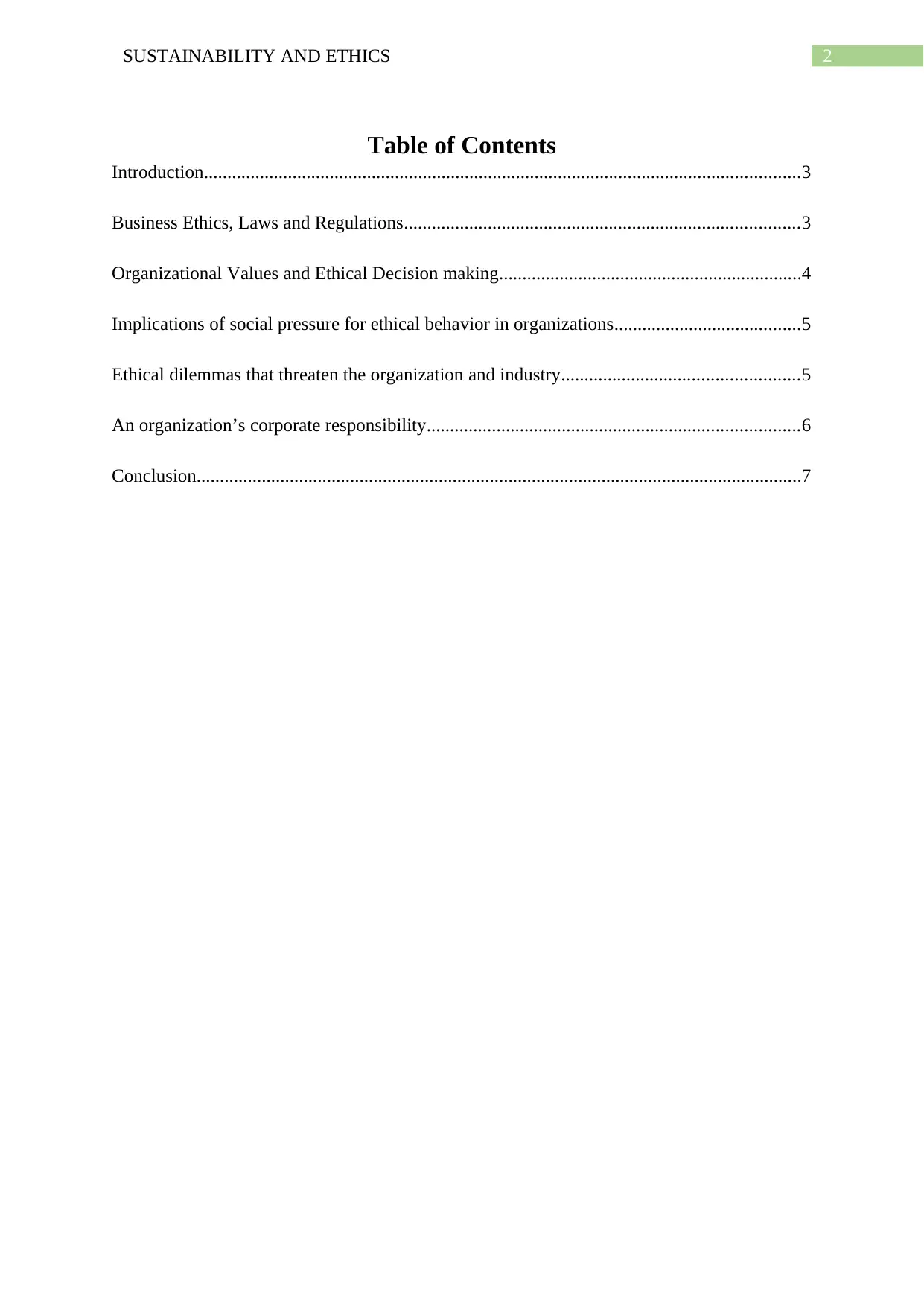
2SUSTAINABILITY AND ETHICS
Table of Contents
Introduction................................................................................................................................3
Business Ethics, Laws and Regulations.....................................................................................3
Organizational Values and Ethical Decision making.................................................................4
Implications of social pressure for ethical behavior in organizations........................................5
Ethical dilemmas that threaten the organization and industry...................................................5
An organization’s corporate responsibility................................................................................6
Conclusion..................................................................................................................................7
Table of Contents
Introduction................................................................................................................................3
Business Ethics, Laws and Regulations.....................................................................................3
Organizational Values and Ethical Decision making.................................................................4
Implications of social pressure for ethical behavior in organizations........................................5
Ethical dilemmas that threaten the organization and industry...................................................5
An organization’s corporate responsibility................................................................................6
Conclusion..................................................................................................................................7
⊘ This is a preview!⊘
Do you want full access?
Subscribe today to unlock all pages.

Trusted by 1+ million students worldwide
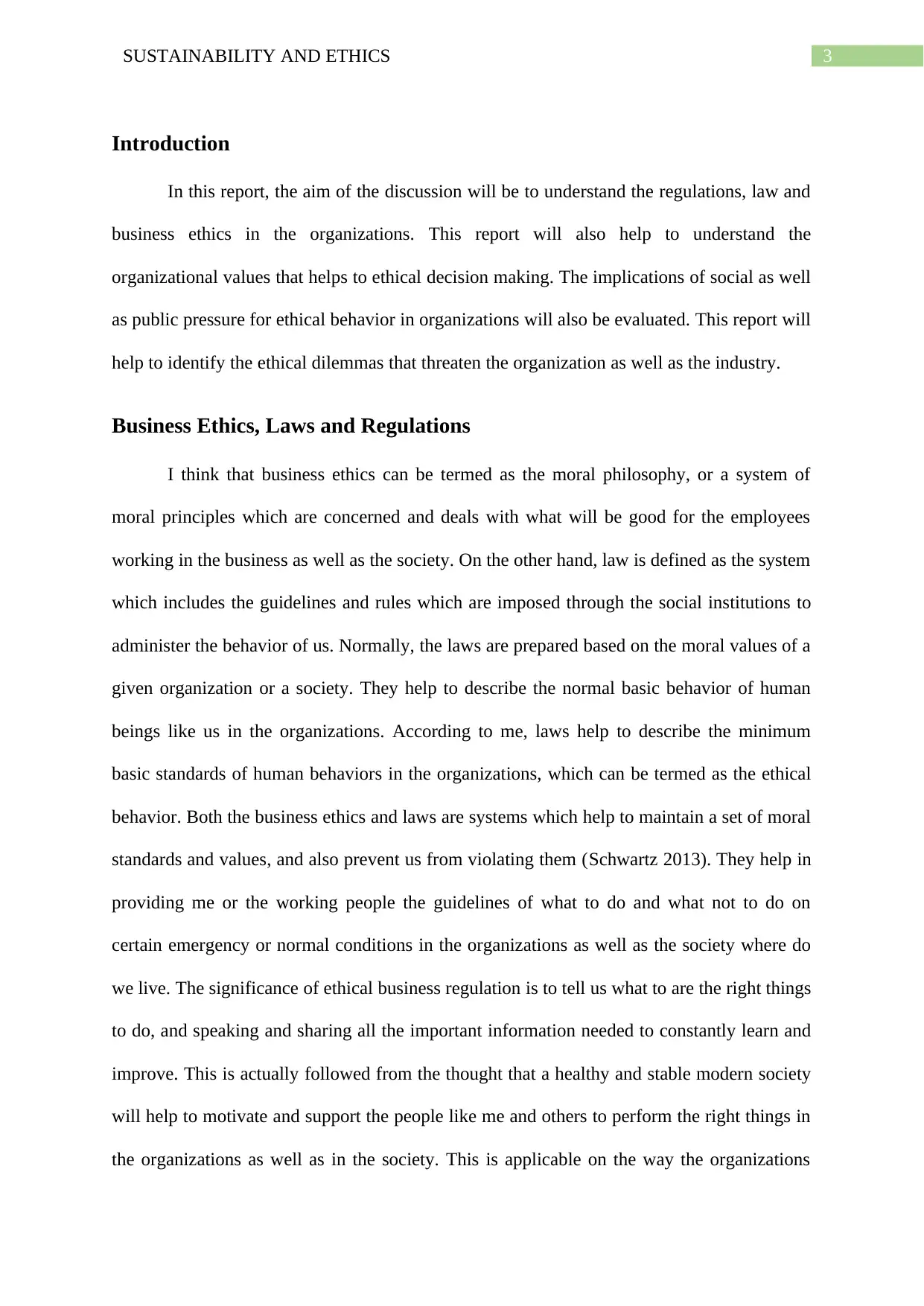
3SUSTAINABILITY AND ETHICS
Introduction
In this report, the aim of the discussion will be to understand the regulations, law and
business ethics in the organizations. This report will also help to understand the
organizational values that helps to ethical decision making. The implications of social as well
as public pressure for ethical behavior in organizations will also be evaluated. This report will
help to identify the ethical dilemmas that threaten the organization as well as the industry.
Business Ethics, Laws and Regulations
I think that business ethics can be termed as the moral philosophy, or a system of
moral principles which are concerned and deals with what will be good for the employees
working in the business as well as the society. On the other hand, law is defined as the system
which includes the guidelines and rules which are imposed through the social institutions to
administer the behavior of us. Normally, the laws are prepared based on the moral values of a
given organization or a society. They help to describe the normal basic behavior of human
beings like us in the organizations. According to me, laws help to describe the minimum
basic standards of human behaviors in the organizations, which can be termed as the ethical
behavior. Both the business ethics and laws are systems which help to maintain a set of moral
standards and values, and also prevent us from violating them (Schwartz 2013). They help in
providing me or the working people the guidelines of what to do and what not to do on
certain emergency or normal conditions in the organizations as well as the society where do
we live. The significance of ethical business regulation is to tell us what to are the right things
to do, and speaking and sharing all the important information needed to constantly learn and
improve. This is actually followed from the thought that a healthy and stable modern society
will help to motivate and support the people like me and others to perform the right things in
the organizations as well as in the society. This is applicable on the way the organizations
Introduction
In this report, the aim of the discussion will be to understand the regulations, law and
business ethics in the organizations. This report will also help to understand the
organizational values that helps to ethical decision making. The implications of social as well
as public pressure for ethical behavior in organizations will also be evaluated. This report will
help to identify the ethical dilemmas that threaten the organization as well as the industry.
Business Ethics, Laws and Regulations
I think that business ethics can be termed as the moral philosophy, or a system of
moral principles which are concerned and deals with what will be good for the employees
working in the business as well as the society. On the other hand, law is defined as the system
which includes the guidelines and rules which are imposed through the social institutions to
administer the behavior of us. Normally, the laws are prepared based on the moral values of a
given organization or a society. They help to describe the normal basic behavior of human
beings like us in the organizations. According to me, laws help to describe the minimum
basic standards of human behaviors in the organizations, which can be termed as the ethical
behavior. Both the business ethics and laws are systems which help to maintain a set of moral
standards and values, and also prevent us from violating them (Schwartz 2013). They help in
providing me or the working people the guidelines of what to do and what not to do on
certain emergency or normal conditions in the organizations as well as the society where do
we live. The significance of ethical business regulation is to tell us what to are the right things
to do, and speaking and sharing all the important information needed to constantly learn and
improve. This is actually followed from the thought that a healthy and stable modern society
will help to motivate and support the people like me and others to perform the right things in
the organizations as well as in the society. This is applicable on the way the organizations
Paraphrase This Document
Need a fresh take? Get an instant paraphrase of this document with our AI Paraphraser
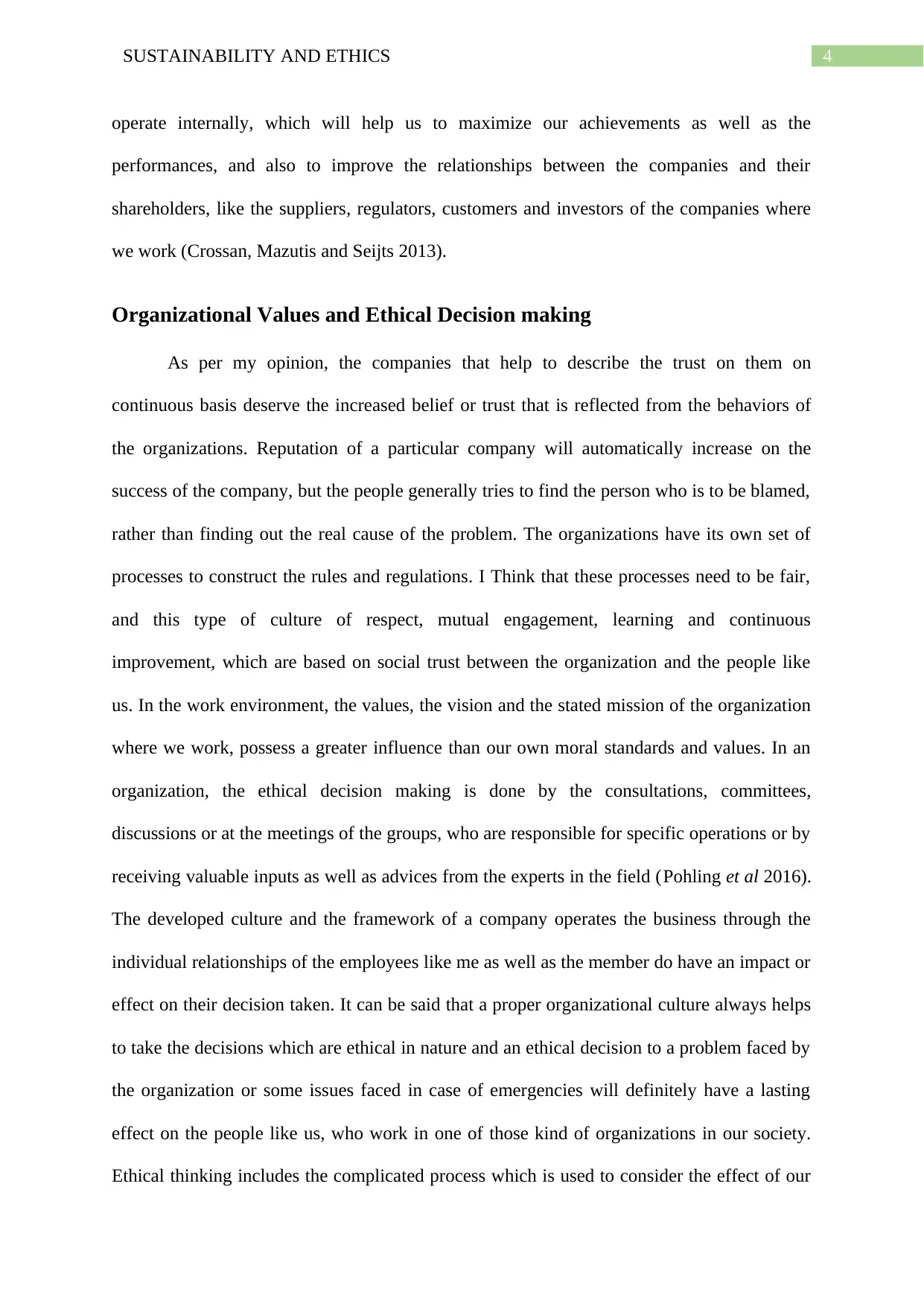
4SUSTAINABILITY AND ETHICS
operate internally, which will help us to maximize our achievements as well as the
performances, and also to improve the relationships between the companies and their
shareholders, like the suppliers, regulators, customers and investors of the companies where
we work (Crossan, Mazutis and Seijts 2013).
Organizational Values and Ethical Decision making
As per my opinion, the companies that help to describe the trust on them on
continuous basis deserve the increased belief or trust that is reflected from the behaviors of
the organizations. Reputation of a particular company will automatically increase on the
success of the company, but the people generally tries to find the person who is to be blamed,
rather than finding out the real cause of the problem. The organizations have its own set of
processes to construct the rules and regulations. I Think that these processes need to be fair,
and this type of culture of respect, mutual engagement, learning and continuous
improvement, which are based on social trust between the organization and the people like
us. In the work environment, the values, the vision and the stated mission of the organization
where we work, possess a greater influence than our own moral standards and values. In an
organization, the ethical decision making is done by the consultations, committees,
discussions or at the meetings of the groups, who are responsible for specific operations or by
receiving valuable inputs as well as advices from the experts in the field (Pohling et al 2016).
The developed culture and the framework of a company operates the business through the
individual relationships of the employees like me as well as the member do have an impact or
effect on their decision taken. It can be said that a proper organizational culture always helps
to take the decisions which are ethical in nature and an ethical decision to a problem faced by
the organization or some issues faced in case of emergencies will definitely have a lasting
effect on the people like us, who work in one of those kind of organizations in our society.
Ethical thinking includes the complicated process which is used to consider the effect of our
operate internally, which will help us to maximize our achievements as well as the
performances, and also to improve the relationships between the companies and their
shareholders, like the suppliers, regulators, customers and investors of the companies where
we work (Crossan, Mazutis and Seijts 2013).
Organizational Values and Ethical Decision making
As per my opinion, the companies that help to describe the trust on them on
continuous basis deserve the increased belief or trust that is reflected from the behaviors of
the organizations. Reputation of a particular company will automatically increase on the
success of the company, but the people generally tries to find the person who is to be blamed,
rather than finding out the real cause of the problem. The organizations have its own set of
processes to construct the rules and regulations. I Think that these processes need to be fair,
and this type of culture of respect, mutual engagement, learning and continuous
improvement, which are based on social trust between the organization and the people like
us. In the work environment, the values, the vision and the stated mission of the organization
where we work, possess a greater influence than our own moral standards and values. In an
organization, the ethical decision making is done by the consultations, committees,
discussions or at the meetings of the groups, who are responsible for specific operations or by
receiving valuable inputs as well as advices from the experts in the field (Pohling et al 2016).
The developed culture and the framework of a company operates the business through the
individual relationships of the employees like me as well as the member do have an impact or
effect on their decision taken. It can be said that a proper organizational culture always helps
to take the decisions which are ethical in nature and an ethical decision to a problem faced by
the organization or some issues faced in case of emergencies will definitely have a lasting
effect on the people like us, who work in one of those kind of organizations in our society.
Ethical thinking includes the complicated process which is used to consider the effect of our
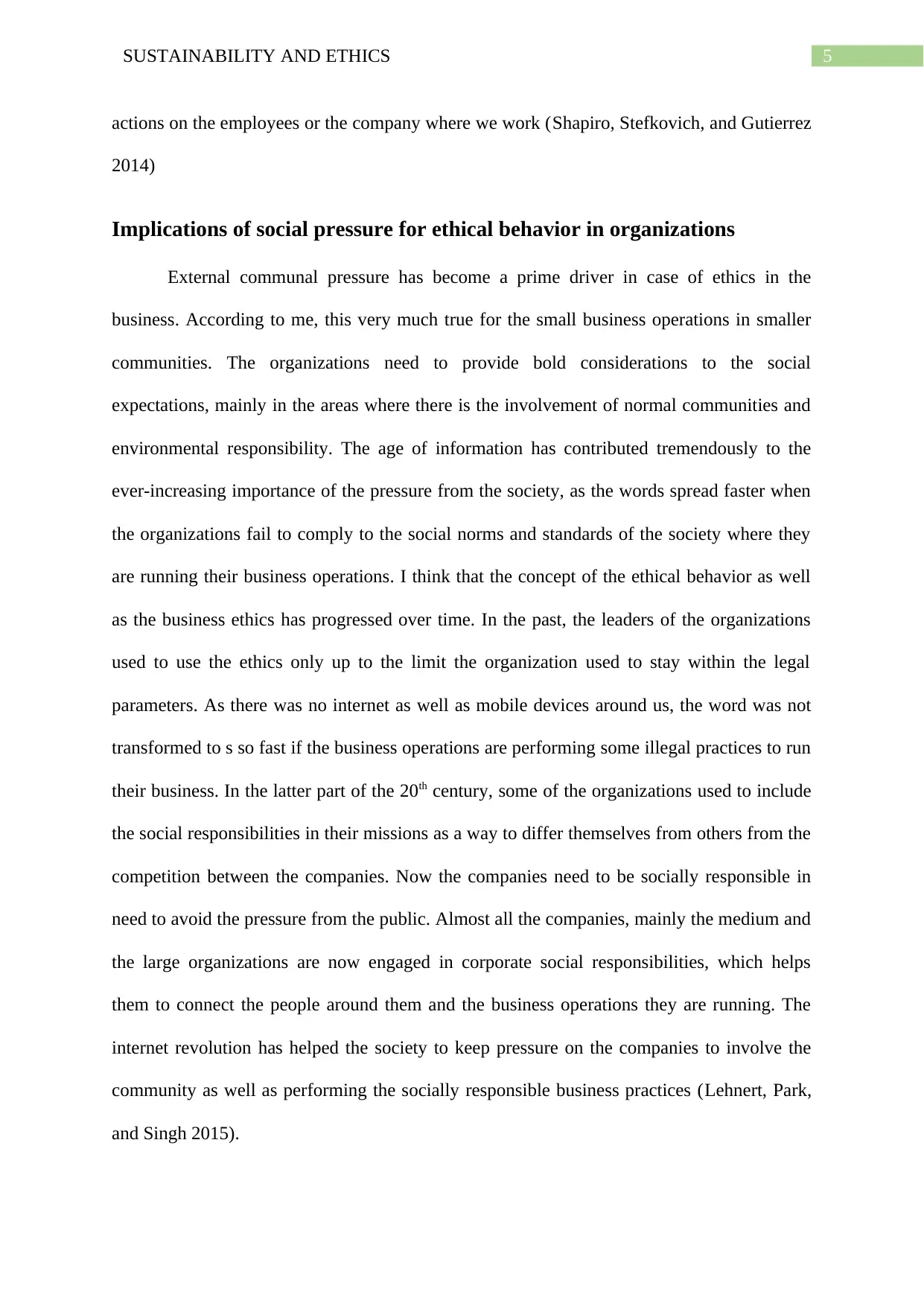
5SUSTAINABILITY AND ETHICS
actions on the employees or the company where we work (Shapiro, Stefkovich, and Gutierrez
2014)
Implications of social pressure for ethical behavior in organizations
External communal pressure has become a prime driver in case of ethics in the
business. According to me, this very much true for the small business operations in smaller
communities. The organizations need to provide bold considerations to the social
expectations, mainly in the areas where there is the involvement of normal communities and
environmental responsibility. The age of information has contributed tremendously to the
ever-increasing importance of the pressure from the society, as the words spread faster when
the organizations fail to comply to the social norms and standards of the society where they
are running their business operations. I think that the concept of the ethical behavior as well
as the business ethics has progressed over time. In the past, the leaders of the organizations
used to use the ethics only up to the limit the organization used to stay within the legal
parameters. As there was no internet as well as mobile devices around us, the word was not
transformed to s so fast if the business operations are performing some illegal practices to run
their business. In the latter part of the 20th century, some of the organizations used to include
the social responsibilities in their missions as a way to differ themselves from others from the
competition between the companies. Now the companies need to be socially responsible in
need to avoid the pressure from the public. Almost all the companies, mainly the medium and
the large organizations are now engaged in corporate social responsibilities, which helps
them to connect the people around them and the business operations they are running. The
internet revolution has helped the society to keep pressure on the companies to involve the
community as well as performing the socially responsible business practices (Lehnert, Park,
and Singh 2015).
actions on the employees or the company where we work (Shapiro, Stefkovich, and Gutierrez
2014)
Implications of social pressure for ethical behavior in organizations
External communal pressure has become a prime driver in case of ethics in the
business. According to me, this very much true for the small business operations in smaller
communities. The organizations need to provide bold considerations to the social
expectations, mainly in the areas where there is the involvement of normal communities and
environmental responsibility. The age of information has contributed tremendously to the
ever-increasing importance of the pressure from the society, as the words spread faster when
the organizations fail to comply to the social norms and standards of the society where they
are running their business operations. I think that the concept of the ethical behavior as well
as the business ethics has progressed over time. In the past, the leaders of the organizations
used to use the ethics only up to the limit the organization used to stay within the legal
parameters. As there was no internet as well as mobile devices around us, the word was not
transformed to s so fast if the business operations are performing some illegal practices to run
their business. In the latter part of the 20th century, some of the organizations used to include
the social responsibilities in their missions as a way to differ themselves from others from the
competition between the companies. Now the companies need to be socially responsible in
need to avoid the pressure from the public. Almost all the companies, mainly the medium and
the large organizations are now engaged in corporate social responsibilities, which helps
them to connect the people around them and the business operations they are running. The
internet revolution has helped the society to keep pressure on the companies to involve the
community as well as performing the socially responsible business practices (Lehnert, Park,
and Singh 2015).
⊘ This is a preview!⊘
Do you want full access?
Subscribe today to unlock all pages.

Trusted by 1+ million students worldwide
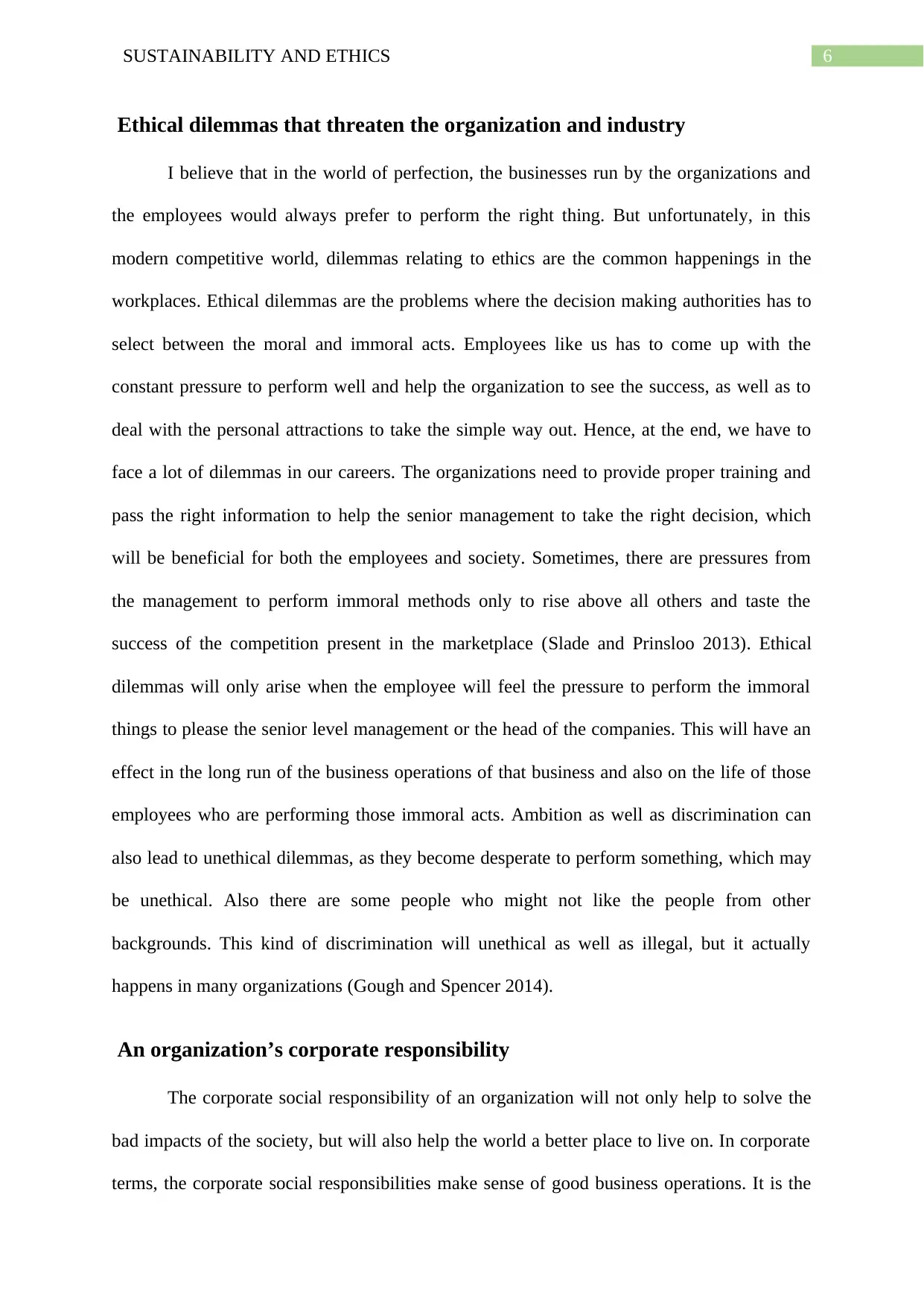
6SUSTAINABILITY AND ETHICS
Ethical dilemmas that threaten the organization and industry
I believe that in the world of perfection, the businesses run by the organizations and
the employees would always prefer to perform the right thing. But unfortunately, in this
modern competitive world, dilemmas relating to ethics are the common happenings in the
workplaces. Ethical dilemmas are the problems where the decision making authorities has to
select between the moral and immoral acts. Employees like us has to come up with the
constant pressure to perform well and help the organization to see the success, as well as to
deal with the personal attractions to take the simple way out. Hence, at the end, we have to
face a lot of dilemmas in our careers. The organizations need to provide proper training and
pass the right information to help the senior management to take the right decision, which
will be beneficial for both the employees and society. Sometimes, there are pressures from
the management to perform immoral methods only to rise above all others and taste the
success of the competition present in the marketplace (Slade and Prinsloo 2013). Ethical
dilemmas will only arise when the employee will feel the pressure to perform the immoral
things to please the senior level management or the head of the companies. This will have an
effect in the long run of the business operations of that business and also on the life of those
employees who are performing those immoral acts. Ambition as well as discrimination can
also lead to unethical dilemmas, as they become desperate to perform something, which may
be unethical. Also there are some people who might not like the people from other
backgrounds. This kind of discrimination will unethical as well as illegal, but it actually
happens in many organizations (Gough and Spencer 2014).
An organization’s corporate responsibility
The corporate social responsibility of an organization will not only help to solve the
bad impacts of the society, but will also help the world a better place to live on. In corporate
terms, the corporate social responsibilities make sense of good business operations. It is the
Ethical dilemmas that threaten the organization and industry
I believe that in the world of perfection, the businesses run by the organizations and
the employees would always prefer to perform the right thing. But unfortunately, in this
modern competitive world, dilemmas relating to ethics are the common happenings in the
workplaces. Ethical dilemmas are the problems where the decision making authorities has to
select between the moral and immoral acts. Employees like us has to come up with the
constant pressure to perform well and help the organization to see the success, as well as to
deal with the personal attractions to take the simple way out. Hence, at the end, we have to
face a lot of dilemmas in our careers. The organizations need to provide proper training and
pass the right information to help the senior management to take the right decision, which
will be beneficial for both the employees and society. Sometimes, there are pressures from
the management to perform immoral methods only to rise above all others and taste the
success of the competition present in the marketplace (Slade and Prinsloo 2013). Ethical
dilemmas will only arise when the employee will feel the pressure to perform the immoral
things to please the senior level management or the head of the companies. This will have an
effect in the long run of the business operations of that business and also on the life of those
employees who are performing those immoral acts. Ambition as well as discrimination can
also lead to unethical dilemmas, as they become desperate to perform something, which may
be unethical. Also there are some people who might not like the people from other
backgrounds. This kind of discrimination will unethical as well as illegal, but it actually
happens in many organizations (Gough and Spencer 2014).
An organization’s corporate responsibility
The corporate social responsibility of an organization will not only help to solve the
bad impacts of the society, but will also help the world a better place to live on. In corporate
terms, the corporate social responsibilities make sense of good business operations. It is the
Paraphrase This Document
Need a fresh take? Get an instant paraphrase of this document with our AI Paraphraser
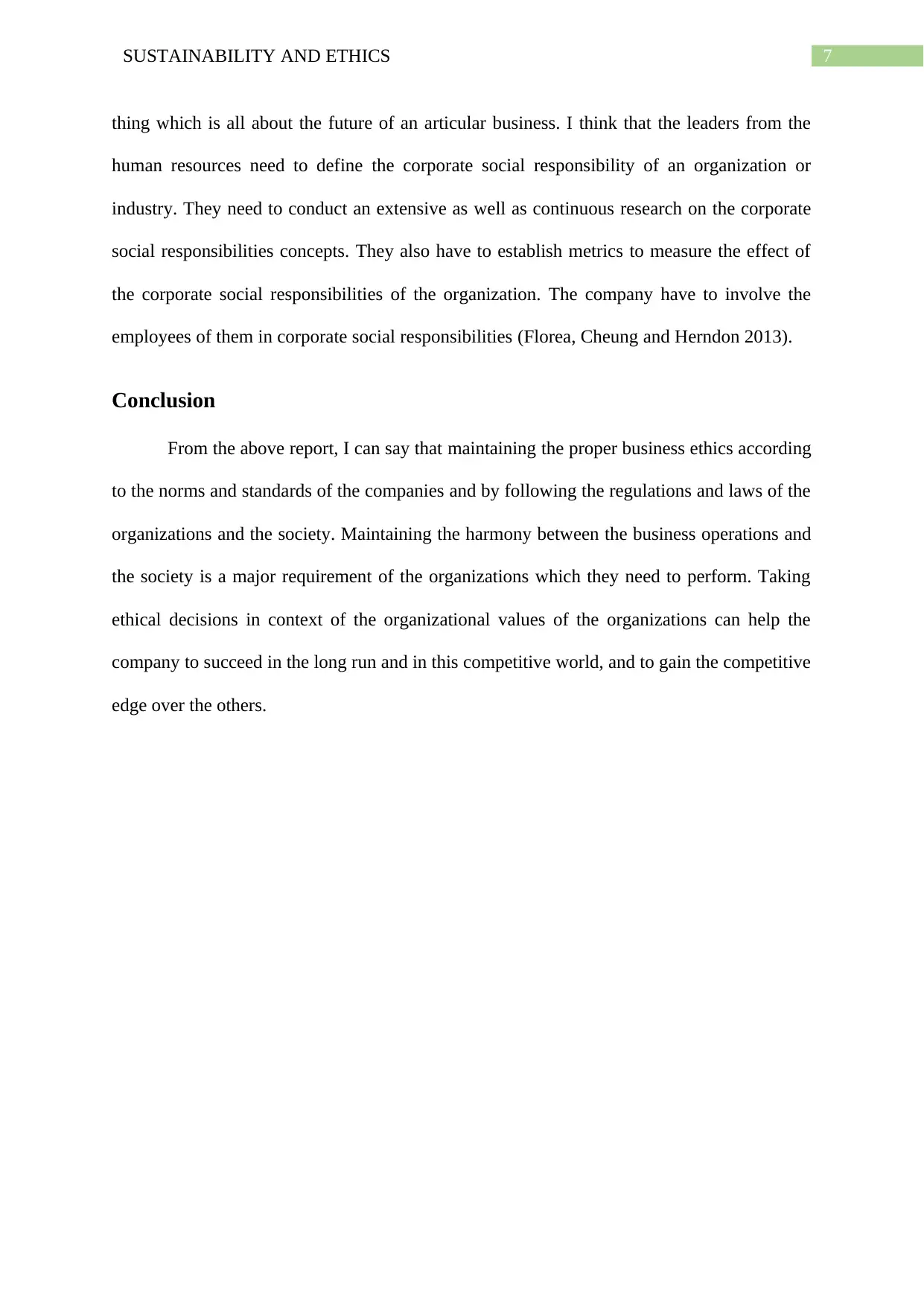
7SUSTAINABILITY AND ETHICS
thing which is all about the future of an articular business. I think that the leaders from the
human resources need to define the corporate social responsibility of an organization or
industry. They need to conduct an extensive as well as continuous research on the corporate
social responsibilities concepts. They also have to establish metrics to measure the effect of
the corporate social responsibilities of the organization. The company have to involve the
employees of them in corporate social responsibilities (Florea, Cheung and Herndon 2013).
Conclusion
From the above report, I can say that maintaining the proper business ethics according
to the norms and standards of the companies and by following the regulations and laws of the
organizations and the society. Maintaining the harmony between the business operations and
the society is a major requirement of the organizations which they need to perform. Taking
ethical decisions in context of the organizational values of the organizations can help the
company to succeed in the long run and in this competitive world, and to gain the competitive
edge over the others.
thing which is all about the future of an articular business. I think that the leaders from the
human resources need to define the corporate social responsibility of an organization or
industry. They need to conduct an extensive as well as continuous research on the corporate
social responsibilities concepts. They also have to establish metrics to measure the effect of
the corporate social responsibilities of the organization. The company have to involve the
employees of them in corporate social responsibilities (Florea, Cheung and Herndon 2013).
Conclusion
From the above report, I can say that maintaining the proper business ethics according
to the norms and standards of the companies and by following the regulations and laws of the
organizations and the society. Maintaining the harmony between the business operations and
the society is a major requirement of the organizations which they need to perform. Taking
ethical decisions in context of the organizational values of the organizations can help the
company to succeed in the long run and in this competitive world, and to gain the competitive
edge over the others.
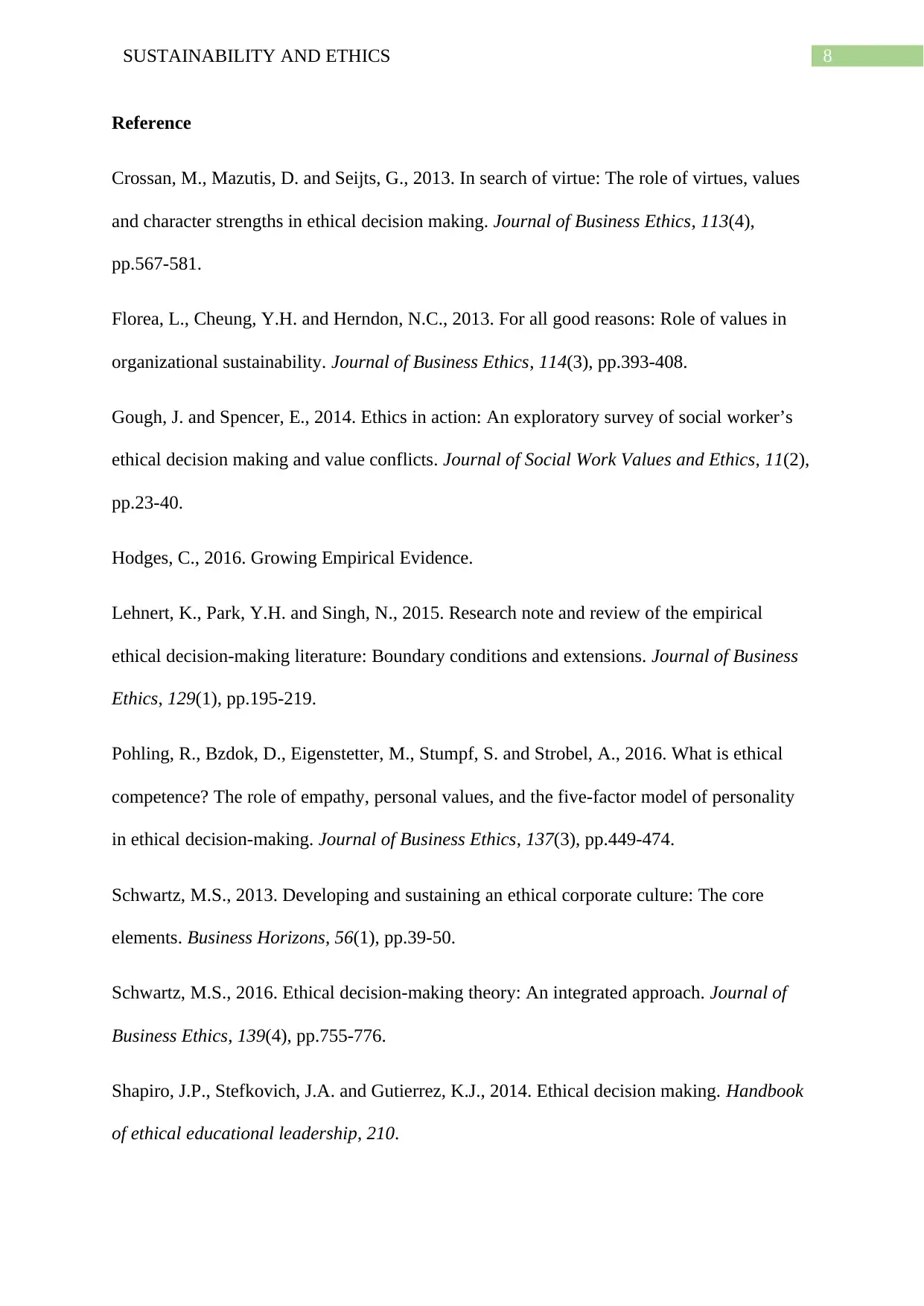
8SUSTAINABILITY AND ETHICS
Reference
Crossan, M., Mazutis, D. and Seijts, G., 2013. In search of virtue: The role of virtues, values
and character strengths in ethical decision making. Journal of Business Ethics, 113(4),
pp.567-581.
Florea, L., Cheung, Y.H. and Herndon, N.C., 2013. For all good reasons: Role of values in
organizational sustainability. Journal of Business Ethics, 114(3), pp.393-408.
Gough, J. and Spencer, E., 2014. Ethics in action: An exploratory survey of social worker’s
ethical decision making and value conflicts. Journal of Social Work Values and Ethics, 11(2),
pp.23-40.
Hodges, C., 2016. Growing Empirical Evidence.
Lehnert, K., Park, Y.H. and Singh, N., 2015. Research note and review of the empirical
ethical decision-making literature: Boundary conditions and extensions. Journal of Business
Ethics, 129(1), pp.195-219.
Pohling, R., Bzdok, D., Eigenstetter, M., Stumpf, S. and Strobel, A., 2016. What is ethical
competence? The role of empathy, personal values, and the five-factor model of personality
in ethical decision-making. Journal of Business Ethics, 137(3), pp.449-474.
Schwartz, M.S., 2013. Developing and sustaining an ethical corporate culture: The core
elements. Business Horizons, 56(1), pp.39-50.
Schwartz, M.S., 2016. Ethical decision-making theory: An integrated approach. Journal of
Business Ethics, 139(4), pp.755-776.
Shapiro, J.P., Stefkovich, J.A. and Gutierrez, K.J., 2014. Ethical decision making. Handbook
of ethical educational leadership, 210.
Reference
Crossan, M., Mazutis, D. and Seijts, G., 2013. In search of virtue: The role of virtues, values
and character strengths in ethical decision making. Journal of Business Ethics, 113(4),
pp.567-581.
Florea, L., Cheung, Y.H. and Herndon, N.C., 2013. For all good reasons: Role of values in
organizational sustainability. Journal of Business Ethics, 114(3), pp.393-408.
Gough, J. and Spencer, E., 2014. Ethics in action: An exploratory survey of social worker’s
ethical decision making and value conflicts. Journal of Social Work Values and Ethics, 11(2),
pp.23-40.
Hodges, C., 2016. Growing Empirical Evidence.
Lehnert, K., Park, Y.H. and Singh, N., 2015. Research note and review of the empirical
ethical decision-making literature: Boundary conditions and extensions. Journal of Business
Ethics, 129(1), pp.195-219.
Pohling, R., Bzdok, D., Eigenstetter, M., Stumpf, S. and Strobel, A., 2016. What is ethical
competence? The role of empathy, personal values, and the five-factor model of personality
in ethical decision-making. Journal of Business Ethics, 137(3), pp.449-474.
Schwartz, M.S., 2013. Developing and sustaining an ethical corporate culture: The core
elements. Business Horizons, 56(1), pp.39-50.
Schwartz, M.S., 2016. Ethical decision-making theory: An integrated approach. Journal of
Business Ethics, 139(4), pp.755-776.
Shapiro, J.P., Stefkovich, J.A. and Gutierrez, K.J., 2014. Ethical decision making. Handbook
of ethical educational leadership, 210.
⊘ This is a preview!⊘
Do you want full access?
Subscribe today to unlock all pages.

Trusted by 1+ million students worldwide
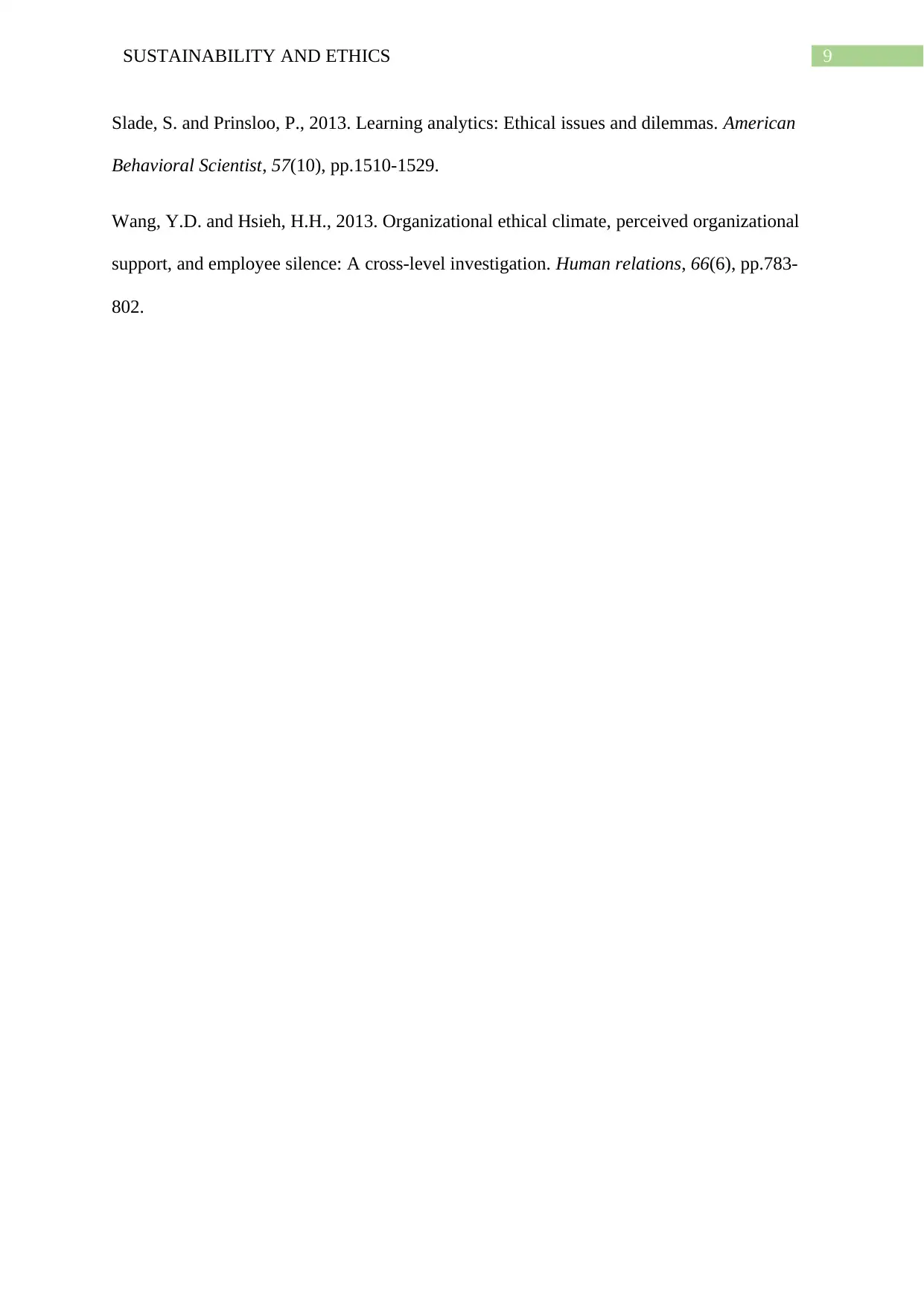
9SUSTAINABILITY AND ETHICS
Slade, S. and Prinsloo, P., 2013. Learning analytics: Ethical issues and dilemmas. American
Behavioral Scientist, 57(10), pp.1510-1529.
Wang, Y.D. and Hsieh, H.H., 2013. Organizational ethical climate, perceived organizational
support, and employee silence: A cross-level investigation. Human relations, 66(6), pp.783-
802.
Slade, S. and Prinsloo, P., 2013. Learning analytics: Ethical issues and dilemmas. American
Behavioral Scientist, 57(10), pp.1510-1529.
Wang, Y.D. and Hsieh, H.H., 2013. Organizational ethical climate, perceived organizational
support, and employee silence: A cross-level investigation. Human relations, 66(6), pp.783-
802.
1 out of 10
Related Documents
Your All-in-One AI-Powered Toolkit for Academic Success.
+13062052269
info@desklib.com
Available 24*7 on WhatsApp / Email
![[object Object]](/_next/static/media/star-bottom.7253800d.svg)
Unlock your academic potential
Copyright © 2020–2026 A2Z Services. All Rights Reserved. Developed and managed by ZUCOL.




